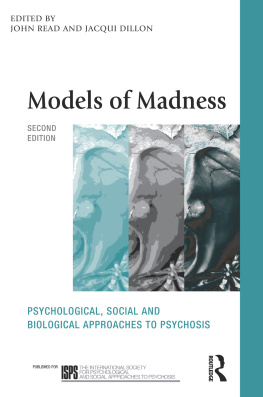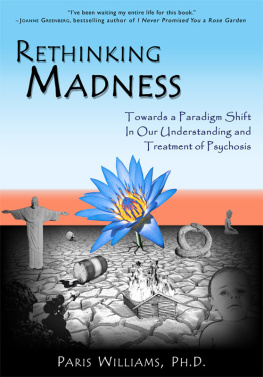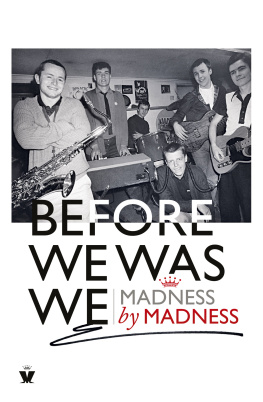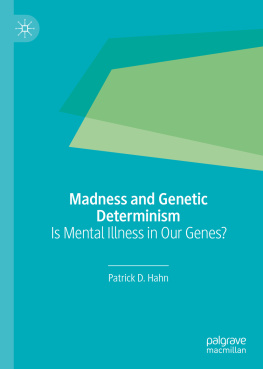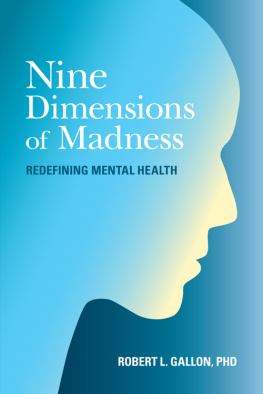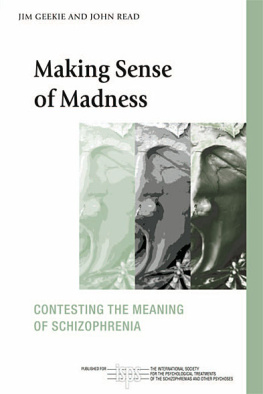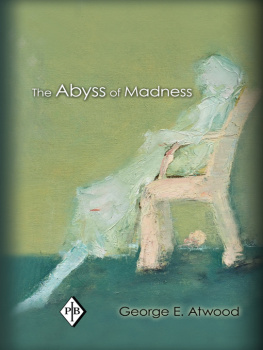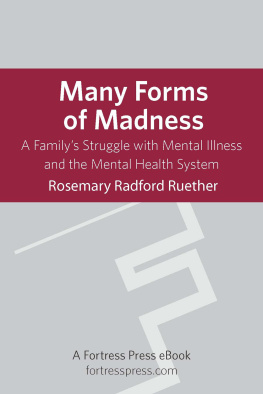John Read - Models of Madness: Psychological, Social and Biological Approaches to Psychosis
Here you can read online John Read - Models of Madness: Psychological, Social and Biological Approaches to Psychosis full text of the book (entire story) in english for free. Download pdf and epub, get meaning, cover and reviews about this ebook. year: 2013, publisher: Routledge, genre: Politics. Description of the work, (preface) as well as reviews are available. Best literature library LitArk.com created for fans of good reading and offers a wide selection of genres:
Romance novel
Science fiction
Adventure
Detective
Science
History
Home and family
Prose
Art
Politics
Computer
Non-fiction
Religion
Business
Children
Humor
Choose a favorite category and find really read worthwhile books. Enjoy immersion in the world of imagination, feel the emotions of the characters or learn something new for yourself, make an fascinating discovery.
- Book:Models of Madness: Psychological, Social and Biological Approaches to Psychosis
- Author:
- Publisher:Routledge
- Genre:
- Year:2013
- Rating:4 / 5
- Favourites:Add to favourites
- Your mark:
Models of Madness: Psychological, Social and Biological Approaches to Psychosis: summary, description and annotation
We offer to read an annotation, description, summary or preface (depends on what the author of the book "Models of Madness: Psychological, Social and Biological Approaches to Psychosis" wrote himself). If you haven't found the necessary information about the book — write in the comments, we will try to find it.
Are hallucinations and delusions really symptoms of an illness called schizophrenia? Are mental health problems really caused by chemical imbalances and genetic predispositions? Are psychiatric drugs as effective and safe as the drug companies claim? Is madness preventable?
This second edition of Models of Madness challenges those who hold to simplistic, pessimistic and often damaging theories and treatments of madness. In particular it challenges beliefs that madness can be explained without reference to social causes and challenges the excessive preoccupation with chemical imbalances and genetic predispositions as causes of human misery, including the conditions that are given the name schizophrenia. This edition updates the now extensive body of research showing that hallucinations, delusions etc. are best understood as reactions to adverse life events and that psychological and social approaches to helping are more effective and far safer than psychiatric drugs and electroshock treatment. A new final chapter discusses why such a damaging ideology has come to dominate mental health and, most importantly, how to change that.
Models of Madness is divided into three sections:
- Section One provides a history of madness, including examples of violence against the mentally ill, before critiquing the theories and treatments of contemporary biological psychiatry and documenting the corrupting influence of drug companies.
- Section Two summarises the research showing that hallucinations, delusions etc. are primarily caused by adverse life events (eg. parental loss, bullying, abuse and neglect in childhood, poverty, etc) and can be understood using psychological models ranging from cognitive to psychodynamic.
- Section Three presents the evidence for a range of effective psychological and social approaches to treatment, from cognitive and family therapy to primary prevention.
This book brings together thirty-seven contributors from ten countries and a wide range of scientific disciplines. It provides an evidence-based, optimistic antidote to the pessimism of biological psychiatry. Models of Madness will be essential reading for all involved in mental health, including service users, family members, service managers, policy makers, nurses, clinical psychologists, psychiatrists, psychotherapists, counsellors, psychoanalysts, social workers, occupational therapists, art therapists.
John Read: author's other books
Who wrote Models of Madness: Psychological, Social and Biological Approaches to Psychosis? Find out the surname, the name of the author of the book and a list of all author's works by series.

